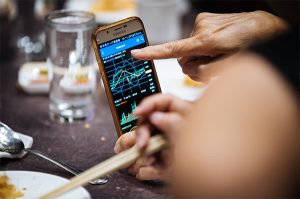Date: February 11, 2019

- STI rose 0.4% in the first week of the Year of the Pig to end at 3,202.04;
- Banks were in focus, DBS due to announce 4Q figures next Monday;
- Share buybacks were down in January;
- US-China trade talks appear to have stalled;
- Europe’s growth revised down as Germany slowed.
The Chinese Year of the Pig got off to a good start last week when the Straits Times Index on Thursday rose 16 points to reclaim the 3,200 level. However, this was likely a delayed reaction to Wall Street’s gains earlier in the week when the local market was closed for the Chinese New Year holidays.
One reason for thinking this was that volume on Thursday was a mediocre 818.2m worth $920m; also adding to skepticism that the bounce would continue was the fact that the index had earlier in the day risen 30 points but finished with a gain of only 16 points. All told, it was very likely a knee-jerk reaction to rises elsewhere during the holiday period.
The index thereafter struggled to hold on to the 3,200 mark, eventually ending the week with a net rise of 18 points or 0.4% at 3,202.04. The highest volume for the week came on Friday when $965.4m was done.
Still, notwithstanding the uninspiring turnover – the holidays could also have played a part since Hong Kong and China were closed for most of the week – investors should be encouraged that the upward momentum since the start of the year when the index gained 3.9% in January carried through to the first week of Feb.
Banks in focus – and so was Best World
Banks have led the index for most of the past two years and so it was again last week. DBS is due to announce its 4Q results for 2018 on 18 Feb (next Monday) and was among the bigger gainers that drove the STI, together with the Jardine group.
UOB-Kay Hian last week in its DBS results preview said it forecasts net profit of S$1.289 billion for 4Q18, down 8.8% quarter-on-quarter(qoq) but up 8% year-on-year (yoy).
“We expect double-digit growth in net interest income of 10.1% yoy, which offsets the decline in contributions from wealth management fees (-3.1% yoy) and net trading income (-47.4% yoy). DBS provides an attractive dividend yield of 5% based on a dividend per share of S$1.20 for 2019. Maintain BUY with an unchanged target price at S$28.50’’ said the broker.
Maybank Kim Eng (MKE) in the meantime, said in a 30 Jan report that DBS’s return on equity (ROE) has expanded by 200 basis points in the past 2-years.
“With the support of widening spreads, positive loan momentum and better cost management, ROEs should continue to widen in the medium term. Our multi-stage dividend discount model (using a cost of equity of 10.3% and 3% terminal value) target price of $30.18 offers 25% upside. With price/book below historical mean, initiate with BUY’’. DBS ended Friday’s session at $24.30.
In a separate report titled “Singapore banks: still got the juice’’, MKE said its 20-year analysis of the banking cycles here suggests the sector is in a ‘consolidation’ phase. “Over the next couple of years, loan growth could slow, but NIMs (net interest margins) should be higher than 2018 levels. Costs and credit charges should be manageable. Additionally, the sector is on a solid footing regionally, with high provisions & strong capital buffers offering quality & safety. As wider returns on assets come through in 2019E, we expect a re-rating’’.
Among the second liners, skincare and beauty products firm Best World stood out when they continued shooting upwards, gaining $0.49 or 18% over the week at $3.19. On Thursday when the stock rose $0.24 the company was queried by the Singapore Exchange. Best World replied that it did not know of reasons for the rise but added that it noticed an upward price movement after it announced that it will announce its 9-month results on 26 Feb.
Share buybacks were down in Jan
Elsewhere, the Singapore Exchange’s investor education portal My Gateway on Thursday reported that there were 21 companies in January that undertook share buybacks. These involved 30 million shares worth $26 million, down from the $78m bought back in December 2018 and from the $54m that was bought back in January 2017.
“The Jan buyback consideration was led by OCBC, Keppel REIT Management, Silverlake Axis, Venture Corporation and Singapore Post which accounted for more than four-fifths of the S$26 million’’ said My Gateway.
US-China trade concerns (again) and European growth worries (again)
On Thursday, news emerged that there has been no progress between the US and China on the trade front and that is unlikely to be a meeting between the two countries’ leaders before the deadline for renewed tariffs on China’s goods next month. This should not have surprised markets since it only continued a pattern that has been well-established over the past 18 months. However, according to news reports it did – Wall Street’s falls on Thursday and Friday were attributed to US-China trade concerns.
On the same day, The European Commission, the EU’s executive arm, revised down its growth forecasts for Germany, widely seen as the main driver of the European economy. The country is now expected to grow by 1.1 percent this year, from a previous forecast of 1.8 percent. The Commission also lowered its prospects for the euro area as a whole. The region is now set to grow 1.3 percent this year, from a previous forecast of 1.9 percent.
US yield curve remained flattish
The gap between the 2-year US Treasury yield and the 10-year hovered below 0.2%, roughly the same it’s been for the past 3 months. Some observers believe that if the yield curve inverts, ie. if the 2-year yields more than the 10-year, then a recession could be on the horizon. The 2-year yield on Friday was 2.467% and the 10-year was 2.631%.





